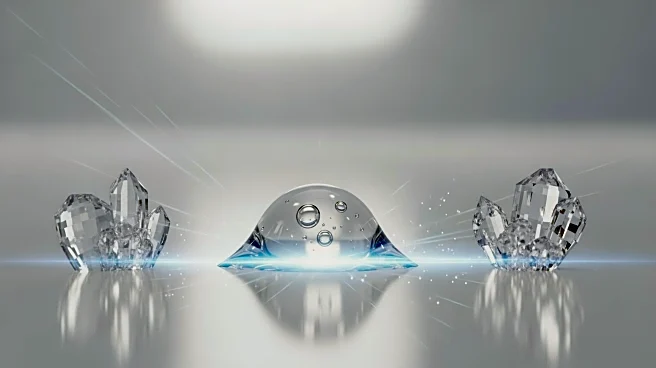What's Happening?
Researchers at the University of Nottingham in the UK are developing a groundbreaking dental gel designed to regenerate tooth enamel and prevent cavities. The gel utilizes a modified version of amelogenin,
a protein that guides enamel growth in infants, to fill holes and cracks in teeth. According to research published in Nature Communications, the gel promotes the growth of enamel crystals in the same orientation as existing enamel, effectively restoring the tooth's protective layer. This innovation could potentially eliminate the need for traditional dental fillings, offering a more permanent solution to tooth decay. The gel is biodegradable and stimulates enamel growth using calcium and phosphate, adhering to teeth for several weeks. While the gel shows promise, dentists remain cautiously optimistic about its real-world application, noting that it may take years before it becomes widely available.
Why It's Important?
The development of this dental gel represents a significant advancement in dental care, potentially transforming how tooth decay is treated. Enamel degradation is a major contributor to dental problems affecting up to 50% of the global population. By offering a method to regenerate enamel, this gel could reduce the need for dental fillings, which are currently the standard treatment for cavities. This innovation could lead to improved dental health outcomes and reduce the long-term costs associated with dental care. Additionally, the gel's ability to regenerate enamel could shift the focus of dental treatment from repair to prevention, emphasizing the importance of maintaining healthy teeth through innovative solutions.
What's Next?
The research team at the University of Nottingham plans to conduct clinical trials to further test the gel's effectiveness in real-world conditions. These trials will assess how the gel performs in the human mouth, considering factors such as heat, saliva, bacteria, diet, and daily habits. If successful, the gel could be commercialized through Mintech-Bio, a startup founded by the lead researcher, Alvaro Mata. However, the timeline for widespread availability remains uncertain, as regulatory approval and market readiness could take several years. Dentists and industry experts will closely monitor the progress of these trials to evaluate the gel's potential impact on dental practices.
Beyond the Headlines
The introduction of a dental gel capable of regenerating enamel could have broader implications for the dental industry. It may necessitate changes in patient education, dental coverage, and treatment protocols, as the focus shifts from traditional fillings to preventive care. This innovation could also inspire further research into biomaterials and their applications in other areas of medicine, potentially leading to new treatments for various conditions. As the technology evolves, ethical considerations regarding accessibility and affordability will need to be addressed to ensure that such advancements benefit a wide range of patients.










